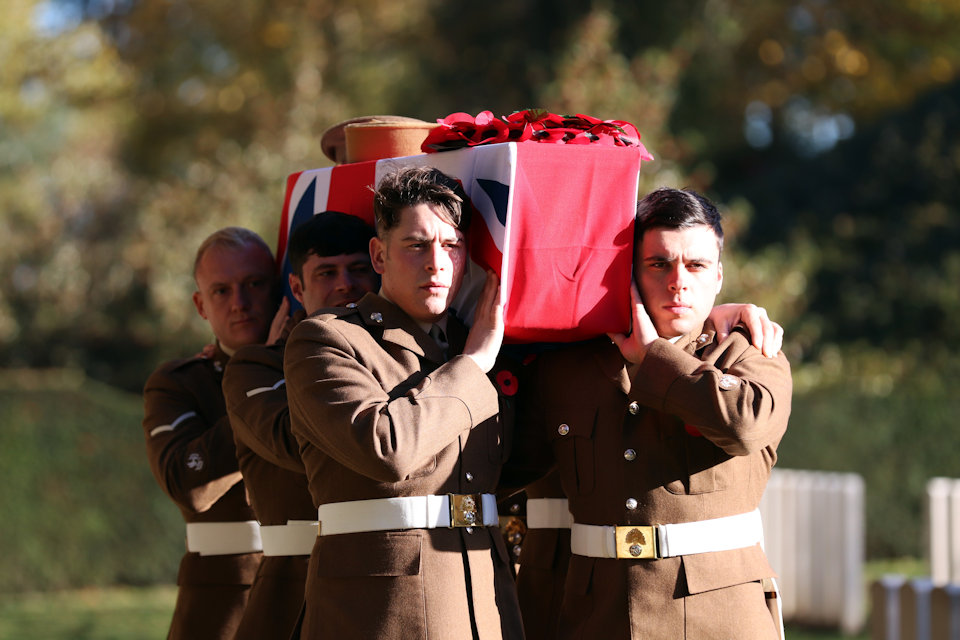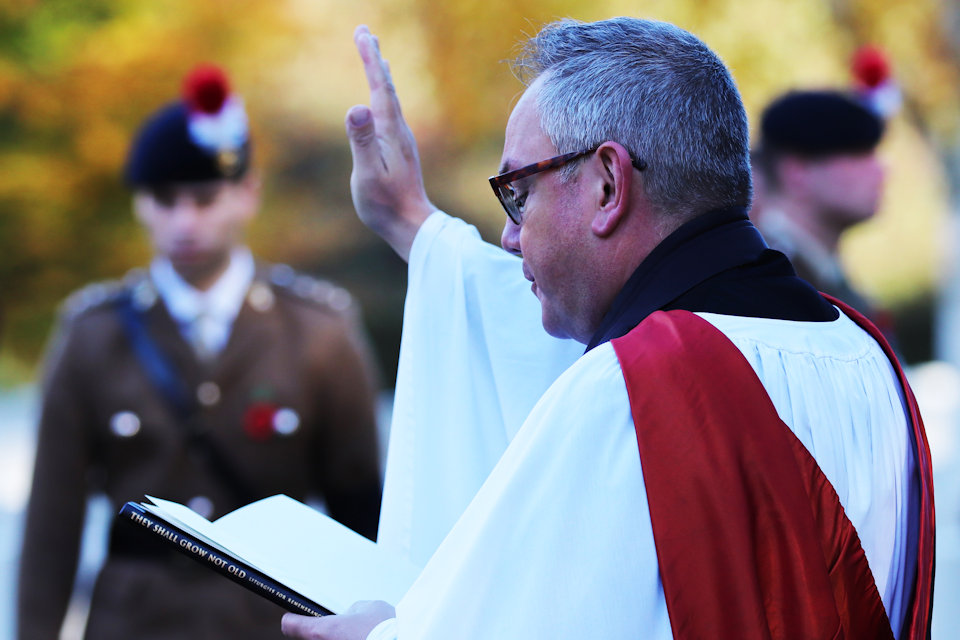News story: Unknown warrior from World War 1 given final resting place
Unknown British solder laid to rest 100 years after he was killed during World War 1.
Unknown British solder laid to rest 100 years after he was killed during World War 1.
An unknown British soldier has been afforded a final resting place 100 years after he was killed during World War 1. The burial, with full military honours, took place on 8 November at Buttes News British Cemetery near Ypres, Belgium

Members of the current day Royal Regiment of Fusiliers formed a bearer party to escort their fallen former comrade into the cemetery within a coffin draped in the union flag. The Reverend Stuart Richards CF, Chaplain to the 1st Battalion The Royal Regiment of Fusiliers conducted the service and paid tribute to the sacrifice the soldier made, and by so many more, 100 years ago.

The service was organised by the MOD’s Joint Casualty and Compassionate Centre, part of Defence Business Services, who work to identify the 40 plus sets of remains of British personnel found on historical World War 1 battlefields, and where possible, trace their surviving families.
The soldier was discovered during engineering works in February 2017 in a field near to the village of Westhoek, near Ypres. Although it can’t be certain when he died, research shows the village of Westhoek was fought over from August to September 1917 during the 3rd Battle of Ypres.

Artefacts found with the soldier included British uniform buttons, a belt buckle and a folded rain cape. Unfortunately, as no regimental insignia were found it has been impossible to trace his name because of the tens of thousands of British soldiers killed with no known grave within the Ypres Salient.
Tracey Bowers, Head of the JCCC Commemorations team said:
Today we have provided a British unknown warrior with his final resting place, 100 years after he died. Sadly, it was not possible to identify him but his name is known unto God and we will always remember the sacrifice he made.
The Commonwealth War Graves Commission, who own and maintain the Buttes News British Cemetery, will now care for the soldier in perpetuity.
The Ministry of Defence has today announced plans for modernising its estate and establishing a broader and more diverse supply base.
The Defence Infrastructure Organisation’s (DIO) new procurement plan outlines a programme of major projects and contacts for the next five financial years.
This includes work to construct new buildings, such as housing and accommodation, the refurbishment of current facilities; as well as services such as catering, waste management and cleaning.
The plan also sets out ambitions to establish a broader and more diverse supply base, including doing more business with small and medium size enterprises (SMEs).
Currently, around 75% of spending on maintenance at defence sites goes directly or indirectly to SMEs, and further diversifying the supply base will help build resilience into projects and provide more opportunities for smaller companies to work on key defence projects.
By listing all the major projects and contracts, the procurement plan will make it easier for existing and potential suppliers to plan ahead, by offering advice on bidding for this work and greater transparency on working with the MOD. These measures will help in particular small businesses, who don’t always have the skills and prior experience of working with the MOD in such areas.
Minister for Defence People and Veterans Tobias Ellwood said:
The defence estate is where our brave armed forces live, work and train and so it’s crucial we give them the best supplies and facilities possible.
Working with industry is critical to delivering this, and our new Procurement Plan ensures the private sector has a head start in bidding for this crucial work.
Opportunities outlined in the Procurement Plan include the £4billion Defence Estate Optimisation Programme, the Future Defence Infrastructure Services contracts – which will provide facilities management across the UK’s military bases- and the £1.3bn Clyde Infrastructure Programme.
The plan also details several prominent works that demonstrate DIO’s key role in supporting defence throughout the UK. These include essential maintenance work worth £568 million to support nuclear infrastructure capability at HMNB Clyde, as well as a £58m investment in a modern submarine training facility at the base.
Alongside this, there are plans for an £8m investment in Bovington Camp to support the AJAX armoured vehicles which will enter service in 2020.
Jacqui Rock, DIO Commercial Director, said:
As DIO we recognise that our current and future suppliers are key to our success. We have worked with industry to produce the Procurement Plan and we are committed to building a broader, more diverse supplier base.
We believe in being as transparent as possible in our procurements and through this new approach we are encouraging new entrants, including small and medium sized enterprises, to consider the benefits and opportunities that working with DIO can deliver.
The Procurement Plan will help achieve the goals set out in our first ever Commercial Strategy. This set out our vision for how we do business and how we will work effectively with our suppliers.
The Procurement Plan also sets out how DIO can deliver social and economic benefits throughout its supply chain by working to contribute to the government’s aim of recruiting 20,000 apprentices through construction procurement and promoting sustainability through its supply chain.
By 2020, DIO has committed to a reduction of greenhouse gas emissions by 30%, a 30% reduction in domestic business flights, a 50% reduction in paper usage and reducing waste going to the landfill to less than 10%.
The full DIO Procurement Plan can be found here
The DIO Commercial Strategy sets the direction for future DIO Procurement Plans. The full DIO Commercial Strategy can be found here
The Post Office became the 3000th signatory of the Armed Forces Covenant.